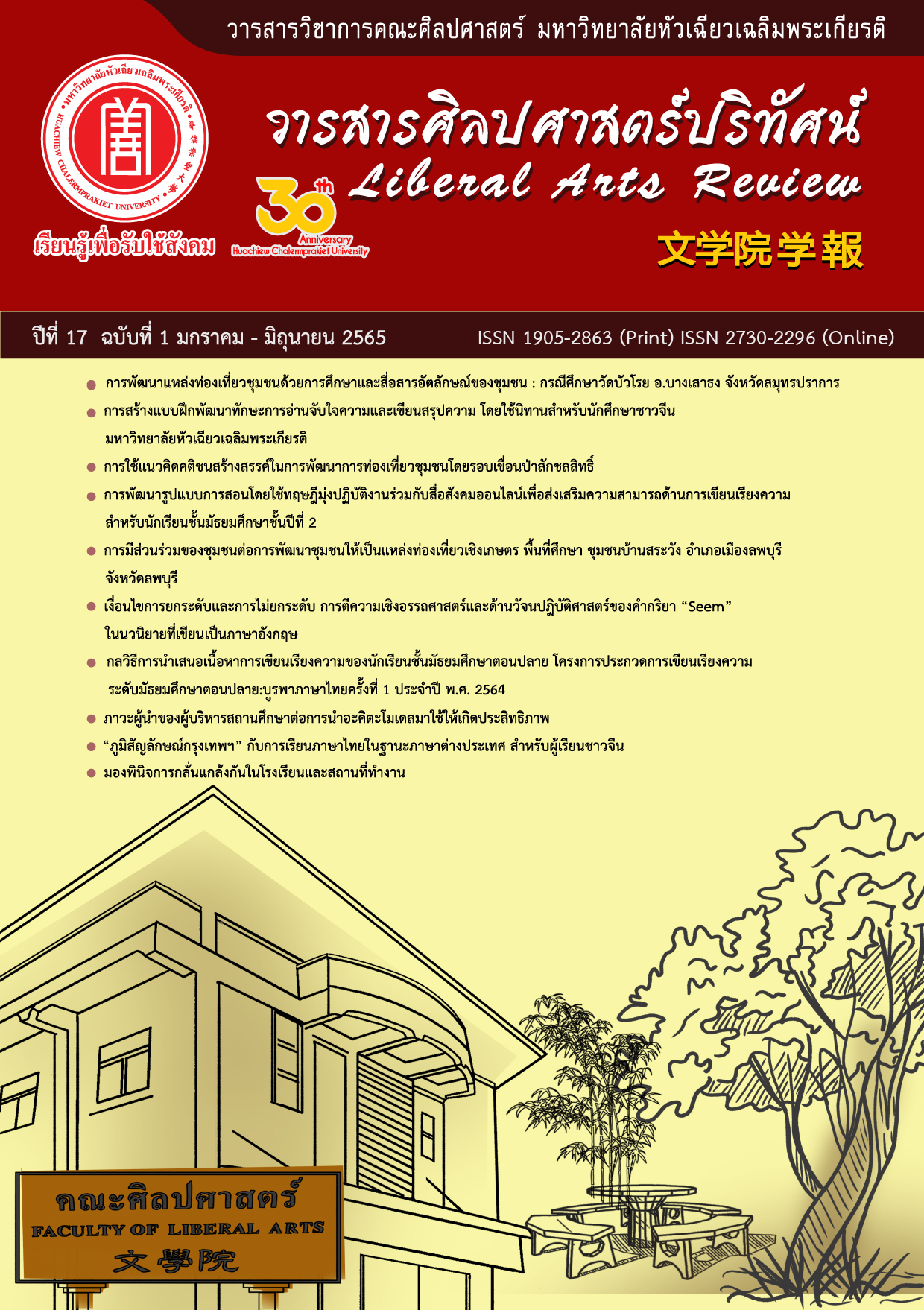Instructional Model Using Task-Based Learning and Social Media for Enhancing Essay Writing Skills for Secondary School Students in Grade 8
DOI:
https://doi.org/10.14456/lar.2022.4Keywords:
Task-Based Learning, Social Media, Essay Writing SkillsAbstract
This research was aimed to 1) develop instructional model using task-based learning and social media, 2) study the effectiveness of instructional model 2.1 compare the essay writing skills before and after using the instructional method, and 2.2 study the student satisfaction towards the instructional method. The sample group of this study was 36 secondary school students in Grade 8 of Kasetsart University Laboratory School, Center for Educational Research and Development, by using cluster random sampling. The observational data on instruction was analyzed by using descriptive statistics; t-test dependent and content analysis. The findings revealed that; 1. The developed instructional method comprised of; 1) principles, 2) objectives, 3) teaching process, 4) measurement and evaluation of teaching, and 5) teaching support factors. The teaching process comprised of; 1) encouraging the knowledge, 2) enhancing the new knowledge, 3) building the understanding, 4) conducting the teaching, and 5) evaluating the teaching. 2. The effectiveness of the instructional model is reflected in the following: 2.1 After using the instructional method, the essay writing skills of students were higher than before at the 0.05 level of significance. 2.2 The student satisfaction towards the teaching method was at the highest level.
References
กรรณิการ์ ทรัพย์สมบูรณ์. (19 กันยายน 2564). สัมภาษณ์. กระทรวงดิจิทัลเพื่อเศรษฐกิจและสังคม สำนักยุทธศาสตร์ สำนักงานพัฒนาธุรกรรมทางอิเล็กทรอนิกส์. (2563) รายงานผลการสำรวจพฤติกรรมผู้ใช้อินเทอร์เน็ตในประเทศไทย ปี 2563 ThaiLand Internet User Behavior 2020. ค้นคืนจาก https://www.etda.or.th/th/newsevents/pr-news/ETDA-released-IUB-2020.aspx
กระทรวงศึกษาธิการ. (2560). ตัวชี้วัดและหลักสูตรแกนกลาง กลุ่มสาระการเรียนรู้ภาษาไทย (ฉบับปรับปรุง พ.ศ. 2560) ตามหลักสูตรแกนกลางการศึกษาขั้นพื้นฐาน พุทธศักราช 2551. กรุงเทพมหานคร: โรงพิมพ์ชุมนุม สหกรณ์การเกษตรแห่งประเทศไทย จํากัด.
ฐะปะนีย์ นาครทรรพ และคณะ. (2546). หนังสือสาระการเรียนรู้พื้นฐานกลุ่มสาระการเรียนรู้ภาษไทย ชั้นมัธยมศึกษาปีที่ 1 (พิมพ์ครั้งที่ 2). กรุงเทพมหานคร: ไทยร่มเกล้า.
นพดล จันทร์เพ็ญ. (2557). หลักการใช้ภาษาไทย. กรุงเทพกรุงเทพมหานคร: เจเนซิส มีเดียคอม.
นิภาวรรณ นวาวัตน์. (2562). การพัฒนารูปแบบการสอนทักษะการพูดภาษาอังกฤษเพื่อการสื่อสารแบบเน้นภาระงานร่วมกับการใช้สื่อสังคมออนไลน์เพื่อเสริมสร้างความสามารถในการพูดภาษาอังกฤษสำหรับนักศึกษาปริญญาตรี (วิทยานิพนธ์ปริญญาดุษฎีบัณฑิต). ภาควิชาหลักสูตรและวิธีสอน บัณฑิตวิทยาลัย มหาวิทยาลัยศิลปากร, นครปฐม.
พนิดา พุฒเขียว และคณะ. (2560). การพัฒนาหลักสูตรอบรมออนไลน์โดยใช้เทคโนโลยีวิดีโอสตรีมมิ่งมีเดีย. วารสารแม่โจ้เทคโนโลยีสารสนเทศและนวัตกรรม, 3(2), 41-53.
พิชิต วิจิตรบุญยรักษ์. (2554). สื่อสังคมออนไลน์ : สื่อแห่งอนาคต. นักบริหาร, 31(4), 99.
ฟองจันทร์ สุขยิ่ง และคณะ. (2553). ศิลปะการเขียนอย่างมืออาชีพ. กรุงเทพมหานคร: อักษรเจริญทัศน์.
ภควัต รักศรี. (2553). เครือข่ายสังคมออนไลน์ (Social Networking). ค้นคืนจาก http://www.coe.or.th/e_engineers/knc_detail.php?id=170
ภัชรวรรณ แก้วใจดี และ อุ่นเรือน เล็กน้อย. (2562). การวิเคราะห์วิธีคิด (Thinking) ของผู้ใช้สื่อออนไลน์ผ่านหมวดความคิดหกใบ. วารสารศิลปศาสตร์ปริทัศน์, 14(2) 97-107.
ภาณุวัฒน์ กองราช. (2554). การศึกษาพฤติกรรมการใช้เครือข่ายสังคมออนไลน์ของวัยรุ่นในประเทศไทย : กรณีศึกษา Facebook. (วิทยานิพนธ์ปริญญามหาบัณฑิต) สาขาการบริหารเทคโนโลยี วิทยาลัยนวัตกรรม มหาวิทยาลัยธรรมศาสตร์, กรุงเทพมหานคร.
มาเรียม นิลพันธุ์. (2558). วิธีวิจัยทางการศึกษา (พิมพ์ครั้งที่ 9). นครปฐม: โรงพิมพ์มหาวิทยาลัยศิลปากร.
ระวิ แก้วสุกใส และชัยรัตน์ จุสปาโล. (2556). เครือข่ายสังคมออนไลน์: กรณีเฟสบุ๊ค (Facebook)กับการพัฒนาผู้เรียน. วารสารมหาวิทยาลัยนราธิวาสราชนครินทร์, 5(4), 195-205.
วรรณพร พิชพรม. (19 กันยายน 2564). สัมภาษณ์.
วิภาดา พูลศักดิ์วรสาร. (2555). การพัฒนารูปแบบการสอนอ่านเน้นภาระงานโดยใช้กลวิธีอภิปัญญาสำหรับผู้ใหญ่เพื่อส่งเสริมความเข้าใจในการอ่านภาษาอังกฤษ. (วิทยานิพนธ์ปริญญาดุษฎีบัณฑิต). สาขาวิชาหลักสูตรและการ สอน บัณฑิตวิทยาลัย มหาวิทยาลัยศิลปากร, นครปฐม.
ศศิณัฏฐ์ สรรคบุรานุรักษ์. (2559). การพัฒนารูปแบบการสอนที่เน้นภาระงานเพื่อส่งเสริมความสามารถในการอ่านภาษาจีนเพื่อความเข้าใจสำหรับนักศึกษาปริญญาตรี. (วิทยานิพนธ์ปริญญาดุษฎีบัณฑิต). ภาควิชาหลักสูตรและวิธีสอน บัณฑิตวิทยาลัย มหาวิทยาลัยศิลปากร, นครปฐม.
ศุภชัย ธูปสุวรรณ. (19 กันยายน 2564). สัมภาษณ์.
สิรินาถ ธารา. (2557). การพัฒนากิจกรรมการอ่านเน้นภาระงานเพื่อเสริมสร้างผลสัมฤทธิ์การอ่านภาษาอังกฤษอย่างมีวิจารณญาณ สำหรับนักเรียนชั้นมัธยมศึกษาปีที่ 5. (วิทยานิพนธ์ปริญญามหาบัณฑิต). ภาควิชาหลักสูตรและวิธีสอน บัณฑิตวิทยาลัย มหาวิทยาลัยศิลปากร, นครปฐม.
อัจฉรา ชีวพันธ์ และคณะ. (2542). การใช้ภาษาไทยเล่ม 1 ชั้นมัธยมศึกษาปีที่ 6. กรุงเทพมหานคร: บรรณกิจ.
อุษา มะหะหมัด. (2557). การพัฒนารูปแบบการสอนอ่านภาษาอังกฤษเน้นภาระงานเพื่อเสริมสร้างทักษะการคิดวิเคราะห์สำหรับนักเรียนชั้นประถมศึกษา. (วิทยานิพนธ์ปริญญาดุษฎีบัณฑิต). สาขาวิชาหลักสูตรและการสอนบัณฑิตวิทยาลัย มหาวิทยาลัยศิลปากร, นครปฐม.
Candlin C. N. (1987). Towards Task-Based Language Learning. In C. Candlin, & D. Murphy (Eds.), Language Learning Tasks. Lancaster Practical Papers in English. Lancaster: Lancaster University.
Ellis R. (2003). Task-based Language Learning and Teaching. Oxford: Oxford University Press.
Littlewood, W. (1995). Communicative Language Teaching. Cambridge: Cambridge University Press.
Nunan D. (1989). Designing Tasks for Communicative Language. Cambridge: CUP.
Willis, J. (1996). A Flexible Framework Task-based learning. Oxford: Heinemann.
Willis, J. (1996). A Framework for Task-based Learning. Harlow: Longman.
Winterowed, R.W. (1981). The Contemporary Writer. New York: Harcout, Bruce Jovanovich.
Downloads
Published
How to Cite
Issue
Section
License
Copyright (c) 2022 Liberal Arts Review

This work is licensed under a Creative Commons Attribution-NonCommercial-NoDerivatives 4.0 International License.
บทความที่ได้รับการตีพิมพ์เป็นลิขสิทธิ์ของวารสารศิลปศาสตร์วิชาการและวิจัย
ข้อความที่ปรากฏในบทความแต่ละเรื่องในวารสารวิชาการเล่มนี้เป็นความคิดเห็นส่วนตัวของผู้เขียนแต่ละท่านไม่เกี่ยวข้องกับมหาวิทยาลัยหัวเฉียวเฉลิมพระเกียรติ และคณาจารย์ท่านอื่นๆ ในมหาวิทยาลัยฯ แต่อย่างใด ความรับผิดชอบองค์ประกอบทั้งหมดของบทความแต่ละเรื่องเป็นของผู้เขียนแต่ละท่าน หากมีความผิดพลาดใดๆ ผู้เขียนแต่ละท่านจะรับผิดชอบบทความของตนเองแต่ผู้เดียว




